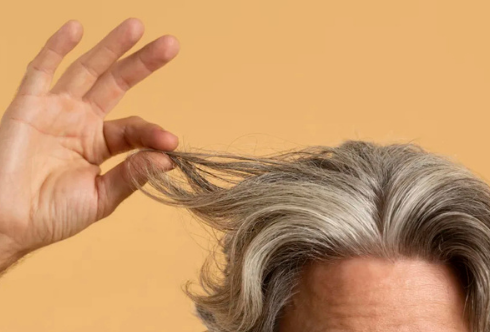Table of Contents
ToggleIntroduction
Have you ever stared at the mirror, brushing your hair, and thought, Is my hair even growing?
I know I have.
A few months ago, I was so eager to grow my hair longer that I found myself checking the length almost every week, hoping for some magical transformation. Sound familiar?
Whether you’re waiting for those dreamy long locks, recovering from a haircut you regret, or just plain curious the question pops up: how much does our hair grow in a month?
It’s something many of us wonder about, but rarely get a clear answer to. Here’s the quick truth: on average, human hair grows about half an inch (1.25 cm) per month.
Of course, that’s just the baseline—your actual growth can be a little faster or slower depending on your genes, age, nutrition, and even stress levels.
In this post, I’m diving into the real facts behind hair growth, what speeds it up, what slows it down, and how you can give your hair the best chance to grow stronger and healthier.
So, make yourself comfortable (maybe with your favorite cup of tea or coffee), and let’s unravel the truth about what’s really happening on your scalp over the next 30 days.
Understand the Hair Growth Cycle: The Basics

Before we jump into how much your hair actually grows in a month, let’s take a step back and understand how hair growth really works.
I remember when I first started reading about this, I was amazed to learn that our hair doesn’t just grow randomly, it follows a smart little cycle with three important stages.
Let me break it down in a simple and friendly way:
1. Anagen Phase: The Growth Sprint
Think of this as the “active growing” stage. Your hair is working hard behind the scenes, growing steadily, thanks to tiny structures called hair follicles. These little powerhouses are constantly producing new hair cells.
And guess what? Your hair can stay in the active growth phase anywhere between two to seven years, and this timing often depends on things like your age, overall health, hormonal balance, and even your family genes. The longer your hair stays in this phase, the more it grows.
2. Catagen Phase – The Pause Button
After growing non-stop, your hair needs a break — and that’s where this short transition phase comes in. It only lasts a few weeks, but it’s like your hair pressing the pause button.
Your hair follicles start to shrink slightly, and that steady growth begins to slow down as your hair prepares for a short resting period.
3. Telogen Phase – Rest and Renewal
Now comes the resting phase. Your hair is no longer growing, just chilling — and after a few months, it naturally falls out.
Sounds a bit alarming? Don’t stress — it’s a totally natural part of your hair’s cycle and nothing to be concerned about. It’s just making room for fresh, healthy strands to grow in its place.
So next time you wonder how long hair grows in a month, remember — it depends on where each strand is in its unique growth cycle. Pretty fascinating, right?
Most studies suggest that hair usually grows around half an inch every month, adding up to nearly six inches in a year. However, this growth isn’t the same for everyone.
Your personal rate depends on factors like genetics, health, and which phase of the hair growth cycle your strands are in.
Most of this steady monthly growth takes place during the Anagen (active) phase, which can last for years and is the reason some people are able to grow their hair much longer than others.
According to Healthline, “hair growth can be influenced by several factors like genetics, hormonal changes, poor nutrition, medications (like chemotherapy), stress, sudden weight loss, or underlying health conditions.
How Genetics Shapes Your Hair Growth Journey
Does Age Affect Hair Growth? Absolutely.

Here’s the thing, just like our skin or energy levels, our hair also changes as we grow older.
In our teenage and early adult years, our hair follicles are like little machines, working overtime to push out new strands quickly.
But as we age, those follicles begin to slow down. The result? Hair that takes longer to grow and sometimes appears thinner.
It’s a natural process, not a flaw. While we might wish we could keep that youthful hair forever, these changes are simply part of life.
The good news? With the right care, we can still keep our hair looking healthy and vibrant, no matter the age
But aging isn’t the only factor—what you eat daily can make or break your hair health.
How Nutrition Fuels Hair Growth

Let me tell you a little story. A few years ago, I was frustrated with my slow hair growth and tried almost every oil and DIY remedy I could find. But what truly made a difference? Fixing my diet.
We often hear the phrase, “You are what you eat,” — and honestly, when it comes to your hair, this couldn’t be more accurate. Your strands, just like your skin and nails, need proper fuel to grow strong and healthy.
Vitamins like A (carrots and sweet potatoes) help in producing sebum, which keeps your scalp nourished. Then there’s vitamin E, found in nuts and seeds — a true hero when it comes to protecting hair from damage and dryness.
One of my personal favorites? Biotin: often called the hair growth vitamin. You’ll find it in foods like eggs, avocados, and salmon. Trust me, once I started adding these to my meals regularly, my hair began to show real improvement.
And let’s not forget about iron: it carries oxygen to your hair follicles, helping them grow stronger. Think leafy greens, beans, and lean meats.
What you eat each day might just be the missing puzzle piece in your journey to healthier, faster-growing hair.
Check out my detailed guide on
Essential nutrients that support healthy hair- Vitamins for Hair Growth and Thickness
Also, here’s a simple hair care routine that can help you see results faster.
Hormones & Hair: The Invisible Forces at Work

Hair and hormones? Oh, they’re deeply connected, more than most of us realize.
I still remember how my hair felt during pregnancy — thicker, shinier, like a shampoo commercial every day. That’s because estrogen levels surge during that time, which extends the growth phase of hair.
On the flip side, post-pregnancy, when hormone levels drop again, many women notice sudden hair fall. I went through that phase too, and it was scary until I understood what was happening.
It’s not just pregnancy. Puberty, menopause, thyroid issues, even stress, all can shake up our hormones and, in turn, impact how fast or how much hair we grow (or lose). Your hormones are like the body’s control panel and when they shift, your hair feels it.
Environmental Impact on Hair Growth

Sometimes, it’s not what’s happening inside, it’s what’s outside that messes with our hair.
Think about it, your hair faces the sun, wind, dust, and pollution almost every day. Over time, UV rays and environmental toxins can weaken your strands and slow down their growth.
Even our styling habits, frequent blow-drying, straightening, coloring can make things worse. I’ve been guilty of over-styling too, especially during festive seasons, only to regret it later when split ends and dryness took over.
That’s why protecting your hair from harsh elements and giving it gentle care matters more than we realize.
Simple habits like covering your hair in harsh sunlight, using a heat protectant before styling, and cutting back on chemical treatments can really help your strands stay strong and grow better over time.
Read More
Summary
As we come to the end of this hair growth journey, here’s something I’ve learned along the way — there’s no one-size-fits-all answer when it comes to how fast our hair grows.
Some people see noticeable changes in just a few weeks, while others have to wait a bit longer. And that’s completely okay.
Your genes, age, hormones, nutrition, and even the environment you live in, they all quietly work together behind the scenes to shape how your hair grows.
I used to think something was wrong with my hair because it didn’t grow as fast as my friend’s, but once I understood the science behind it, I started focusing less on speed and more on nurturing it with patience and care.
So here’s my advice to you: love your hair at every stage, be kind to your strands, feed your body well, and protect your hair like the crown it is. Growth will follow, slowly but surely.
Frequently Asked Questions
Q. How fast does hair usually grow in a month?
On average, hair tends to grow about half an inch (1.25 cm) per month. But don’t be surprised if yours grows a little more or a little less, everyone’s hair has its own pace, and sometimes even different parts of your scalp grow at different speeds.
Q. What factors affect how quickly hair grows?
Quite a few, actually. Your genetic makeup, age, diet, hormonal health, and even how much stress you’re under can all play a role. Even seasonal changes or certain medications can have an effect.
Q. Can I really make my hair grow faster?
While there’s no magic potion that’ll give you Rapunzel-length hair overnight, you can support healthier growth by:
- Eating a nutrient-rich diet
- Staying hydrated
- Managing stress
- Avoiding harsh styling habits
- Getting regular scalp massages to boost circulation
Consistency is key, and small daily habits can lead to big results over time.
Q. Does trimming your hair help it grow faster?
It’s a common myth, but no, trimming your hair doesn’t actually speed up growth from the roots.
However, trimming helps prevent split ends, which keeps your hair looking healthier and fuller as it grows out. So yes, it’s still a smart move.
Q. Are there any natural remedies for hair growth that really work?
Many people (myself included) have seen some benefits from natural remedies like:
- Scalp massages using rosemary or coconut oil
- Onion juice treatments (yes, it smells, but it works for some)
- Green tea rinses
- Biotin or collagen supplements
That said, everyone’s hair responds differently, and it’s always wise to patch-test and consult a professional if you’re unsure.
How onion juice may boost hair growth naturally- Onion Juice for Hair

